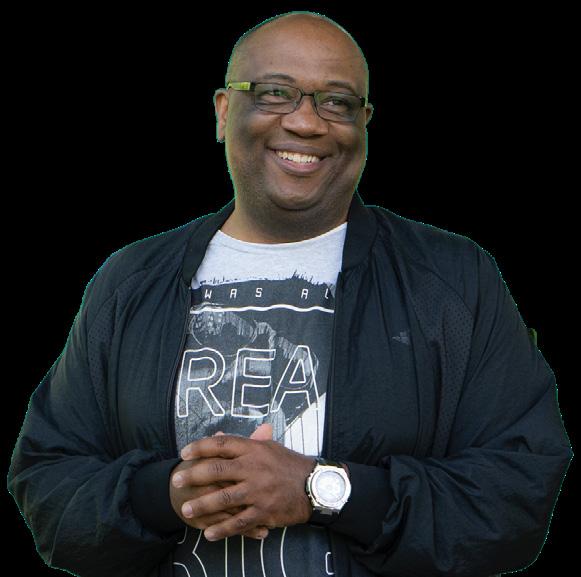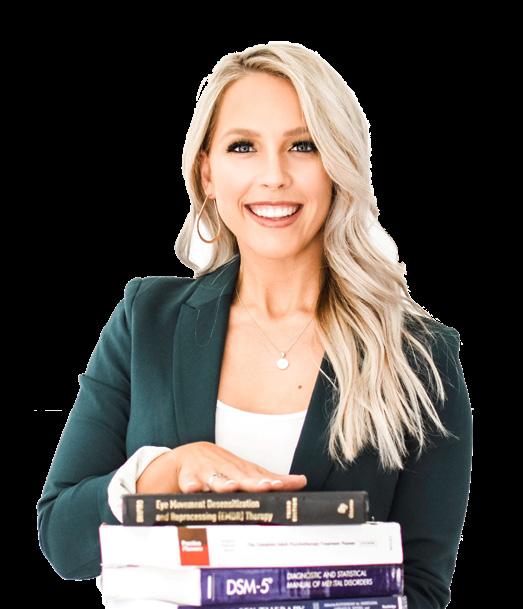
8 minute read
MOVERS & SHAKERS
Elliott Connie ’01 M.A. ’06
When leading psychotherapist and author Elliott Connie ’01 M.A. ’06 delivered the keynote presentation at Texas Wesleyan’s University College Day 2021, it was a sort of homecoming, albeit a virtual one. Connie, who graduated from the university’s counseling program, presented the topic “Hope for Humanity During Times of Social Unrest” virtually at the university’s biggest annual student-research event. For Connie, the homecoming was warm. “It’s one thing to impact your world,” Connie said, “but it’s even more important to impact your own backyard.” Connie knows about both. He has built a career and platform embracing change. Connie, a Massachusetts native, moved to Texas and earned a bachelor’s degree in psychology at Texas Wesleyan while enjoying life on campus in O.C. Hall. Connie jumped into the working world but returned to Texas Wesleyan for his master’s degree after being recruited by Michael Ellison, professor of counseling. But then a strange thing happened. He started to fall out of love with psychotherapy and began researching other methods and approaches. He discovered solutions-focused brief therapy and dove into the material. While the rumblings of change were still a faint murmur in mental health care, another, albeit more digital, revolution was also taking place. Connie found a world of opportunity in the new communication tools. He jumped into social media and YouTube, posting videos, dispensing real-talk advice, and building a community of experts and listeners. It elevated him to a new platform, one without the gatekeepers that seemed to keep its professional ranks older and whiter. For Connie, it’s about communication: He’s released four books in addition to the 2009 book he authored with Linda Metcalf, director of graduate counseling programs, and his evergrowing social media presence, which includes a podcast he co-hosts with
Left to right: Elliott Connie, Katie Pritchett and Amanda Averbeck
Adam Froerer, director of the MFT program at Mercer University, Atlanta, called “The Details with Elliott and Adam,” where the two discuss mental health and current events, and a vlog called “Solutions Every Day,” where Connie discusses mental health, inspiration and wisdom. Connie’s style connected with the times. He speaks in relatable language and peppers his expertise with references from Jay-Z and Richard Pryor. He’s funny and warm even in his reflective moments. He’s a believer in people, and he encourages them to embrace the moment. “You can do or be anything you want,” Connie said. “It takes hard work and self-assurance.” But that moment has been increasingly challenging on the mental health of students and the larger higher ed community. The U.S. was facing worsening mental health conditions before the COVID-19 pandemic and social unrest gripped the country in 2020. It’s worsened since then. Nearly one-in-five Americans suffer from some form of mental illness, according to the National Institute for Mental Health, and rates of mental illness, suicidal ideation and uninsured patients are all rising, according to Mental Health America. The statistics are a poor stand-in for real people with real lives who are dealing with mental illness – and Connie is part of a new generation of mental health counselors that are using digital delivery methods to share their message, reach clients and develop solutions for the global mental health crisis. It’s a charge he feels comfortable leading. “It can be hard, it can be scary,” Connie said, “but change is good.”

Katie Pritchett M.S. ’20 & Amanda Averbeck M.S. ’19
After Katie Pritchett M.S. ’20 got her counseling degree from Texas Wesleyan, she didn’t want to lose the connections and relationships she had built during her time in the counseling program. That’s why she and fellow counseling alumna Amanda Averbeck M.S. ’19 started a counseling alumni network (Averbeck graduated with a master’s in marriage and family therapy), a Facebook community that connects Texas Wesleyan alumni and students of all license types to support each other and serve their communities. We asked Katie and Amanda about what drove their desire to become counselors, their experience at Texas Wesleyan, and their vision for alumni of the program.
Why did you start the TXWES counseling alumni group?
Katie Pritchett: We are all connected — past, present and future students — because we all have Texas Wesleyan counseling in common. When I was a student, I would have loved to have had a forum to talk with students that were further along in the program or alumni. As a new student, talking to seasoned graduate students or clinicians can be a little intimidating. Having a voluntary group where we have common ground makes things more welcoming. I want everyone to feel welcome, seen and supported. Amanda Averbeck: When I started the program, I was grateful to be chosen as a scholarship recipient and knew I wanted to give back in a way that would support other students. For a few years, I have listened to colleagues describe their experience of postgraduation and pre-licensure as a type of lonely limbo. When I graduated, I had similar feelings. My earlier desire to give back to the program was rekindled and began to take shape as a counseling alumni network. I hope even after we are seasoned therapists, we can continue to form a strong RAMily of TXWES counselors who support each other with consultation groups, socials and occasional CEU opportunities.
Why is it important to be a part of a counseling group, like our alumni group?
KP: The alumni group provides support, resources and a wonderful opportunity for networking. You can learn about upcoming CEUs, hear about job openings, discover resources others are using in practice, have your questions answered and so much more. You also can help others in areas that you have experience with.
Tell us about your experience in the TXWES counseling program.
KP: I had a wonderful time while I was in the TXWES counseling program. Everything from the interview process to the classroom instruction and friends I made was a wonderful experience. I think the best part of my time there was having access to the counseling center. Texas Wesleyan has a beautiful facility, supervisors and colleagues there any time you need assistance, so many different tools to use alongside the counseling process, and a chance to “work” in a counseling setting on-site. AA: I greatly enjoyed my experience. To use y’all’s words, smaller is smarter, especially for a counseling program. Getting to know my professors and colleagues in such an intimate manner has positively impacted how I do therapy. I was educated as a person, not just a number. I am not sure I would have experienced such individualized support at a larger institution.
– Elliott Connie ’01 M.A. ’06
Why did you want to become a counselor?
KP: I wanted to become a counselor because I saw it as an opportunity to sit with people during some of their hardest times and help them sort through their stuff. It is an honor to work with individuals every day that are learning, growing and recognizing the strengths within. I get to go to work every day with the goal in mind that I will be “fired” because my client has gained all the tools in their toolbox that they need to move forward in their life healthier than when they came in.
AA: Several older and wiser therapists have described the desire to become a counselor as a calling. I have also experienced it this way. I can think of no other way I want to spend my time on earth than having the privilege of being with someone as they take on the grueling work to become the person they want to be.
Who was a favorite professor?
KP: I loved all my professors at Texas Wesleyan, but Richard Bishop really had an impact on me while I was in the program. I was the only person in my cohort that was pursuing a Cognitive Behavioral Therapy Model, and Dr. Bishop was always right there to help me work through cases when I got stuck. He invited interesting and helpful speakers to class, always had a lot of interesting stories to share with the class, and genuinely cared about us being successful clinicians. I learned so much from Dr. Bishop. AA: Misti Sparks is the professor who has had (and continues to have) the most impact on my development as a therapist. She has mastered the art of being fully present, personable and professionally poised. She strikes a lovely balance between providing a strong sense of support and giving space for me to discover my own answers and learn from my mistakes. As a person who learns best by experience, I appreciate and admire teachers who can provide this type of learning environment. I am honored she has agreed to be my supervisor so I can continue to learn from her postgraduation. I also hope to follow her example and create a similar learning environment for my clients.
What’s your favorite thing about your job?
KP: I love seeing people improving and reaching their goals week to week. Sometimes, when people first come to see you, they are so defeated. There are many incredible moments along the way and witnessing the change from slumped shoulders and sadness to walking in purpose and confidence is an overwhelming feeling. And that doesn’t even have to do with me as a counselor. It has to do with this amazing individual sitting in front of me, doing the work in and outside of therapy, and changing their life. I just get to foster a safe, secure place for that to happen.
Any advice for people who are looking to become a counselor?
AA: Becoming a counselor will change you for the better. Allow the growth to unfold and enjoy the process; it’s neverending. Continually engage in selfgrowth so that you can be an authentic guide to those who come to you for help with the growth process.








